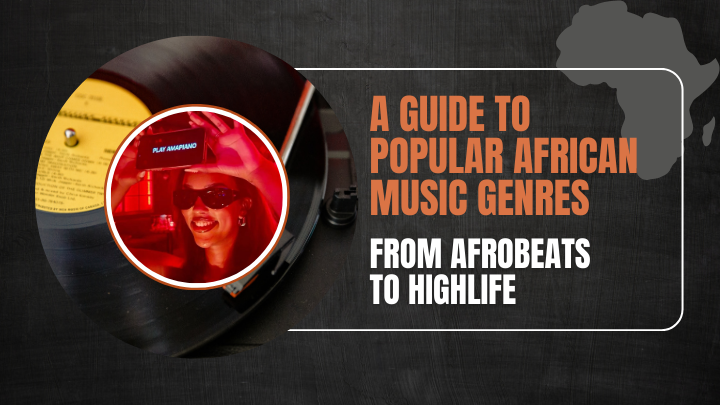A Guide to Popular African Music
Africa’s rich and diverse culture is beautifully reflected in its music. Across the continent, music plays an integral role in celebrations, ceremonies, and daily life. From energetic rhythms to soulful melodies, the music of Africa spans various genres, each offering a unique flavor. In this guide, we explore some of the most popular African music genres, including Afrobeats, Amapiano, Soukous, Highlife, and Afro-Jazz.
1. Afrobeats: The Global Phenomenon
Afrobeats is one of the most influential music genres to emerge from Africa in recent years. It’s a vibrant fusion of African rhythms with Western influences like hip-hop, dancehall, and pop. Although similar to Afrobeat (popularized by Fela Kuti), Afrobeats is not the same—it’s a more modern, upbeat sound that has gained immense global popularity.
Artists like Wizkid, Burna Boy, Davido, and Tiwa Savage are pioneers of Afrobeats, bringing the genre into the international spotlight. The infectious beats, catchy melodies, and energetic tempo make Afrobeats a favorite in clubs worldwide. It’s not just a genre of music; it’s a cultural movement that celebrates African pride, storytelling, and dance.
2. Amapiano: The South African Sound
Originating from South Africa, Amapiano is an emerging genre that blends deep house, jazz, and traditional African sounds like kwaito and the marimba. The genre’s name, which translates to "the pianos" in Zulu, references its distinctive piano melodies and basslines.
Amapiano has gained popularity across Africa and beyond, with artists like Kabza De Small, DJ Maphorisa, and Sha Sha leading the charge. Its infectious rhythms, catchy piano riffs, and smooth transitions make it a hit at parties and in mainstream radio. The genre’s laid-back vibe, combined with its ability to get people dancing, has made Amapiano one of the most exciting genres to emerge in African music in recent years.
3. Soukous: The Heartbeat of Central Africa
Soukous is a genre that originated in the Democratic Republic of Congo (DRC) and has become the heartbeat of Central African music. Characterized by its fast-paced rhythms, smooth guitar riffs, and upbeat melodies, Soukous has evolved from traditional Congolese rumba into a more electric and contemporary sound.
Famous artists like Papa Wemba, Koffi Olomide, and Franco Luambo Makiadi helped popularize Soukous across Africa and the world. Its influence can be felt in many genres, from Afrobeat to reggae, and it remains a cornerstone of African music. With its compelling rhythms and melodic hooks, Soukous is a genre that continues to capture the essence of celebration and joy.
4. Highlife: A Legacy of West African Elegance
Highlife music originated in Ghana in the early 20th century and soon spread to other West African countries. A fusion of Western instruments (like brass and guitars) with traditional African rhythms, Highlife blends jazz, swing, and indigenous sounds, creating a rich, layered musical experience.
Artists like E.T. Mensah, Amakye Dede, and Osibisa have helped shape Highlife’s sound. The genre has evolved over the years, blending more contemporary sounds into its traditional roots. Highlife is known for its lively rhythms and lyrical focus on social issues, love, and celebration. Whether it's a lively dance tune or a soulful ballad, Highlife remains one of the most respected and influential genres in West Africa.
5. Afro-Jazz: The Fusion of African Rhythms and Jazz
Afro-Jazz is a genre that blends traditional African rhythms with the improvisational and harmonic elements of jazz. It emerged in the 20th century as African musicians began experimenting with jazz and blues while still staying connected to their cultural roots.
Artists like Hugh Masekela, Manu Dibango, and Mulatu Astatke have been instrumental in shaping the genre, drawing on influences from both African and Western musical traditions. Afro-Jazz features complex rhythms, intricate melodies, and a strong sense of improvisation, making it a sophisticated and soulful genre that resonates deeply with music lovers around the world.
Africa’s music scene is as diverse and vibrant as its cultures, and each genre tells a unique story of the continent’s history, people, and traditions. From the global reach of Afrobeats to the soulful rhythms of Afro-Jazz, the evolution of African music continues to captivate audiences both on the continent and across the world. Whether you’re dancing to Amapiano’s infectious beats or reflecting on the soulful melodies of Highlife, African music offers something for every listener to enjoy.
So, whether you’re a seasoned fan or a newcomer, dive into the world of African music—each genre offers a unique rhythm that connects the world to the heart of Africa.



